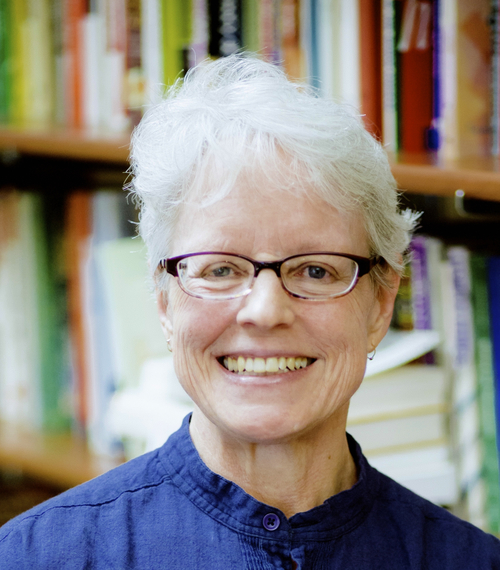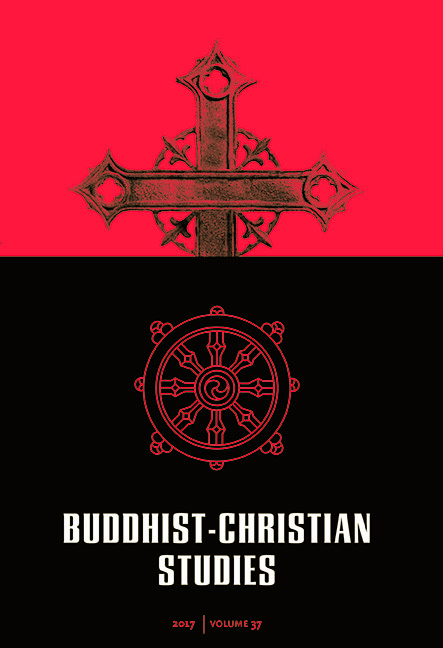Buddhist-Christian Studies is one of four society journals currently published by University of Hawai`i Press. The journal started here in Honolulu as the product of the 1980 East-West Religions Project conference titled “A Buddhist-Christian Conference on the Future of Humanity,” and it was first edited by UH professor emeritus David W. Chappell. We asked current co-editors Thomas Cattoi and Carol Anderson to share more about the society and the journal’s focus.

First, what is the Society for Buddhist-Christian Studies?
The Society for Buddhist-Christian Studies was founded in 1987 in order to continue interactions between Buddhist and Christian scholars and practitioners that began at several large international meetings in the early 1980s. In 1980 and again in 1984 two major international conferences were held at the University of Hawai’i, which led to the establishment of the “Cobb-Abe International Theological Encounter.” The latter was founded by process theologian John B. Cobb, Jr., and Kyoto-school philosopher Masao Abe; for the following twenty years (1984-2004), the Cobb-Abe group continued to meet every eighteen months to discuss issues connected with Buddhist-Christian dialogue.
In 1987, another large international conference on Buddhist-Christian interchange was held at the Graduate Theological Union in Berkeley. At that meeting, a small group of scholars and practitioners decided to establish a society that could meet annually in conjunction with the American Academy of Religion (AAR). This led to the birth of the Society for Buddhist-Christian Studies. The Society is independent of the AAR and controls its own program, rather than being a section of the AAR. Most members are scholars and graduate students in the field of Buddhist-Christian studies, but membership is open to all.
Has Buddhist-Christian Studies changed over the years?
The first issue of the journal was published in 1981. Its content and orientation reflects the evolution of the field over the last few decades, which was influenced by the quick expansion of Buddhist and Asian studies in English-language universities, as well as the growing interest in interreligious dialogue in different Christian communities.

What makes a good interreligious dialogue?
This is an interesting question! Every person engaged in interreligious dialogue will give you a different answer. For me (Cattoi), interreligious dialogue requires the ability to be conversant in two different religious traditions, remaining grounded in one’s own while also engaging the other with integrity. This means that one should be open to points of contact between two traditions, while also acknowledging the presence of irreducible differences.
What do you typically publish?
The journal publishes articles, book reviews, and news items on the relationship between Buddhism and Christianity. The journal is open to a variety of methodologies, including comparative theology and religious studies, and we accept submissions from Buddhist authors, Christian authors, and authors of any or no religious/denominational background. The articles selected for publication address both historical and contemporary topics, including speculative reflections on classical texts and material culture, as well as matters relevant to Buddhist and Christian practice today. We also traditionally publish the papers from the panels sponsored by the Society in conjunction with the annual AAR meeting.

Volume 37 opens with a special section titled “What is Wrong with Us? What is Wrong with the World?” What’s that all about?
At the annual meeting of the AAR in 2015, the Society for Buddhist-Christian Studies sponsored a panel on karma and original sin, featuring a number of speakers that explored the relationship between the two notions. Clearly, there is quite a lot that is wrong with our world! Different religious traditions have attempted to offer different answers and this is what was discussed at the panel. Volume 37 features a number of papers that grew out of this panel presentation.
Each issue of Buddhist-Christian Studies includes a Frederick J. Streng Award winner. Who is Frederick J. Streng and how is this award chosen?
Frederick J. Streng (1933-1993), a native of Texas, completed his PhD at the University of Chicago under Mircea Eliade, Joseph Kitagawa, and Bernard Meland, graduating in 1963. His dissertation was on the Buddhist thinker Nagarjuna and was later published as Emptiness: A Study in Religious Meaning (Nashville: Abingdon Press, 1967). He was a professor at Southern Methodist University from 1966 until his passing. Beginning in 1969, he launched The Religious Life of Man series with Dickenson Publishing Company that included separate volumes by different authors on Islam, Japanese Religion, Chinese Religion, Buddhism, Hinduism, Primitive Religion, Judaism, Christianity, and Native American Religions. The son of a Lutheran minister, Streng was a Unitarian Universalist with a strong academic and personal interest in Eastern religions and was one of the leading figures in the development of the comparative study of religion in the second half of the 20th century.
This award in his memory honors a work in Buddhist-Christian dialogue published over the previous few years. A committee established by the Society for Buddhist-Christian Studies chooses the winner every year, following recommendations from other members of the board. The latest winner is Charles R. Strain from DePaul University for his work The Prophet and the Bodhisattva (Eugene, Or.: Wipf and Stock, 2014), comparing the lives and work Daniel Berrigan SJ and Thich Nhat Hahn.

What’s in store for your next volume (Volume 38)?
We will publish the papers from a panel that was held at the AAR meeting in 2016, called “Is Spirituality intrinsically communal?” The papers will explore the concept of spiritual practice from both Christian and Buddhist perspectives, asking specifically to what degree spirituality is or should be inherently communal vs. individual in orientation.
Sign up for new issue email alerts from Project MUSE
Find the full text of Volume 37 at Project MUSE
 About the Journal
About the Journal
Buddhist-Christian Studies is a scholarly journal published annually by University of Hawai‘i Press. It presents research papers, book reviews, and news items on Buddhism and Christianity, their interrelation, and comparative study based on historical materials and contemporary experience.
Subscriptions
Annual subscriptions for both individuals and institutions are available here. Individual subscription is also available through membership in the Society for Buddhist-Christian Studies (SBCS).
Submissions
The materials selected for publication will be balanced between historical research and contemporary practice, and, where possible, they should employ analytical and theoretical tools and be set within the framework of our shared human history. More information is available at the journal’s website.





